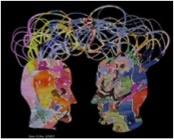By Chad Lloyd
 Most people have heard of the scientific method. The scientific method is the process that we use as scientists to help make discoveries. This method is also the process everyone uses when making decisions, which shows that everyone does science on a daily basis! The first part of the scientific method is similar to what we do when studying for a test or exam. We start off with a question, such as “If we heat up plastic, what will happen?” We can then perform a literature search, in which we look at what people have done in the past, to get ideas of what we think may happen. For scientists, a literature search will typically involve looking at scientific articles that are published online by other scientists in what we call journals. This journal is different from something you write in; it is just a collection of scientific articles. For instance, maybe people have seen that plastic will melt when heated or that it will burn—maybe people have even seen that nothing will happen. Half of research is reading what others have done so that we do not perform the same experiments over and over again to answer the same question. The way that scientists most often communicate or share ideas is through writing scientific articles about their research and discoveries.
Most people have heard of the scientific method. The scientific method is the process that we use as scientists to help make discoveries. This method is also the process everyone uses when making decisions, which shows that everyone does science on a daily basis! The first part of the scientific method is similar to what we do when studying for a test or exam. We start off with a question, such as “If we heat up plastic, what will happen?” We can then perform a literature search, in which we look at what people have done in the past, to get ideas of what we think may happen. For scientists, a literature search will typically involve looking at scientific articles that are published online by other scientists in what we call journals. This journal is different from something you write in; it is just a collection of scientific articles. For instance, maybe people have seen that plastic will melt when heated or that it will burn—maybe people have even seen that nothing will happen. Half of research is reading what others have done so that we do not perform the same experiments over and over again to answer the same question. The way that scientists most often communicate or share ideas is through writing scientific articles about their research and discoveries.
Next, we make our hypothesis—this will help guide your experimental design as it is stating what we think will happen when we heat the plastic up! We then test our hypothesis with an experiment. For example, our initial experiment may be to investigate what happens when we put the plastic in an oven. We collect data and observations and analyze them to get our results. After we get our results, we communicate them to people we know by telling them what we did and what happened and then testing something else out that we still want to know. Since the scientific method is an ongoing process, there are always new things to discover based off of previous findings. These next tests we call future directions, and they help explain what we would do next time we want to run an experiment related to this one. For instance, while we were heating that plastic, maybe we wanted to know if a different heat source, such as fire, does something different than putting it in the oven?
 Once we have made discoveries, what next? How do we get people to know that we did something awesome?! We have many different ways to communicate our scientific discoveries. As mentioned earlier, the most common way we can communicate things is through writing scientific articles. Thousands of scientific journals are available—two of the most commonly known are Nature and Science. Another way to communicate is by going to conferences, or events where many scientists gather to discuss their research. Science communication is becoming more popular outside of school through informal education. Informal education is the way that most of us learn in everyday life. It is learning something through experiencing it and generally occurs outside of a traditional classroom setting. This learning can be achieved by talking with your neighbors about your awesome new discoveries, or by sharing them with your peers.
Once we have made discoveries, what next? How do we get people to know that we did something awesome?! We have many different ways to communicate our scientific discoveries. As mentioned earlier, the most common way we can communicate things is through writing scientific articles. Thousands of scientific journals are available—two of the most commonly known are Nature and Science. Another way to communicate is by going to conferences, or events where many scientists gather to discuss their research. Science communication is becoming more popular outside of school through informal education. Informal education is the way that most of us learn in everyday life. It is learning something through experiencing it and generally occurs outside of a traditional classroom setting. This learning can be achieved by talking with your neighbors about your awesome new discoveries, or by sharing them with your peers.
When communicating science, one thing to keep in mind is that we want to be trusted. In order to be trusted, we need to conduct and report ethical science. When most people think of ethics, they think of morals and what is “right or wrong.” So why would we be concerned with ethics in science? How does this field related to social sciences and the humanities become important for people who work in science, technology, engineering, and math (STEM) fields?
 The main reason is that we want to have others be able to trust what we are telling them or publishing in a scientific journal. If we make false statements in a journal, we could have a negative impact on our society. What do you think would happen if we made up fake results for an experiment we performed? For example, what would happen if we stated that mixing two liquids together made something smell good when it really made a bad smell that would not go away for weeks? While this may sound like a prank, what if we performed an experiment stating that it was completely safe to eat a certain kind of berry when in reality it made someone sick? For this reason, it is important to communicate the truth in science so that we ensure that others who learn about our discoveries remain safe and can trust what we do! After all, science is awesome, so let’s keep it that way.
The main reason is that we want to have others be able to trust what we are telling them or publishing in a scientific journal. If we make false statements in a journal, we could have a negative impact on our society. What do you think would happen if we made up fake results for an experiment we performed? For example, what would happen if we stated that mixing two liquids together made something smell good when it really made a bad smell that would not go away for weeks? While this may sound like a prank, what if we performed an experiment stating that it was completely safe to eat a certain kind of berry when in reality it made someone sick? For this reason, it is important to communicate the truth in science so that we ensure that others who learn about our discoveries remain safe and can trust what we do! After all, science is awesome, so let’s keep it that way.
Edited by Christina Marvin and Rachel Battaglia
